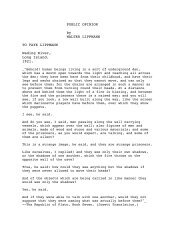Tacit Knowing: Its Bearing on Some Problems of Philosophy
Tacit Knowing: Its Bearing on Some Problems of Philosophy
Tacit Knowing: Its Bearing on Some Problems of Philosophy
Create successful ePaper yourself
Turn your PDF publications into a flip-book with our unique Google optimized e-Paper software.
Michael Polanyi http://faculty.uml.edu/rinnis/45.301%20Ways%20<strong>of</strong>%20Knowi...<br />
This brings into sight <strong>on</strong>ce more the process <strong>of</strong> empirical<br />
inducti<strong>on</strong>. I have noted the heuristic powers <strong>of</strong> a true universal<br />
c<strong>on</strong>cepti<strong>on</strong>, and have now c<strong>on</strong>solidated the idea <strong>of</strong> such powers<br />
by pointing out our capacity to recognize problems, to know good<br />
problems from bad <strong>on</strong>es, and to pursue these successfully, by<br />
feeling our steady approach to their soluti<strong>on</strong>. The work <strong>of</strong> the<br />
scientist c<strong>on</strong>sists in doing all these things. He notices clues that<br />
seem significant, and, if he is an experimenter, tries to turn up<br />
new clues that would give him further guidance. All the time his<br />
attenti<strong>on</strong> is fixed <strong>on</strong> the meaning <strong>of</strong> the clues he has collected so<br />
far, while he is feeling his way towards new ideas and new<br />
evidence, by following his sense <strong>of</strong> approaching discovery. This<br />
procedure does not essentially differ from that <strong>of</strong> percepti<strong>on</strong>, to<br />
which I have affiliated it. Any sustained effort to make out what<br />
c<strong>on</strong>fr<strong>on</strong>ts us in a c<strong>on</strong>fusing c<strong>on</strong>figurati<strong>on</strong> <strong>of</strong> sights, is an exercise<br />
<strong>of</strong> similar powers <strong>of</strong> searching for clues by sensing the nearness<br />
<strong>of</strong> a significant shape to which they might tend to crystallize.<br />
I have said that the capacity to know a problem is the<br />
most striking instance <strong>of</strong> our powers to integrate the meaning <strong>of</strong> a<br />
set <strong>of</strong> particulars by fixing our attenti<strong>on</strong> <strong>on</strong> a gap behind which<br />
we anticipate the presence <strong>of</strong> yet hidden knowledge. Before<br />
developing this further, let me recall that we had already<br />
recognized these heuristic powers in a less dynamic form<br />
wherever we rely <strong>on</strong> our awareness <strong>of</strong> particulars for establishing<br />
the presence <strong>of</strong> a comprehensive entity. For this was always<br />
viewed as something real, which being real, might be expected<br />
yet to manifest itself at some future time in unexpected ways. I<br />
have shown how this c<strong>on</strong>firmed in its own way the comm<strong>on</strong> sense<br />
metaphysical belief that solid objects were something bey<strong>on</strong>d the<br />
aggregate <strong>of</strong> their observed properties and that the mind is<br />
something bey<strong>on</strong>d its overt manifestati<strong>on</strong>s; I have also shown that<br />
this c<strong>on</strong>cepti<strong>on</strong> <strong>of</strong> meaning reveals the thing that is named by a<br />
universal term. But it is still the course <strong>of</strong> scientific inquiry in<br />
which the metaphysical c<strong>on</strong>cepti<strong>on</strong> <strong>of</strong> a reality bey<strong>on</strong>d our<br />
tangible experience is written out most clearly, for all to see.<br />
From its very start, the inquiry assumes, and must assume, that<br />
there is something there to be discovered. The fascinati<strong>on</strong>, by<br />
which al<strong>on</strong>e the inquiry can make progress, is fixed <strong>on</strong> discerning<br />
what it is that is there, and when discovery is achieved, it comes<br />
to us accredited by our c<strong>on</strong>victi<strong>on</strong> that its object was there all<br />
al<strong>on</strong>g, unrecognized. The rise, the path, the end, all point at the<br />
same reality and cannot but tell <strong>of</strong> it. Swearing by the existence<br />
<strong>of</strong> this reality, the scientist imposes <strong>on</strong> himself the discipline <strong>of</strong><br />
his vocati<strong>on</strong>. And his sense <strong>of</strong> approaching nearer to reality is not<br />
exhausted by the c<strong>on</strong>summati<strong>on</strong> <strong>of</strong> discovery. It persists in the<br />
belief that what he has discovered is real, and being real, will yet<br />
mark its presence by an unlimited range <strong>of</strong> unsuspected<br />
implicati<strong>on</strong>s. Deemed to be an aspect <strong>of</strong> reality, the new<br />
knowledge is believed to be fruitful and is claimed to be<br />
universally valid.<br />
Here we meet the c<strong>on</strong>cepti<strong>on</strong> <strong>of</strong> truth. Modern<br />
antimetaphysical philosophies, like pragmatism, operati<strong>on</strong>alism,<br />
positivism, and logical positivism, have tried to spell out the<br />
implicati<strong>on</strong>s <strong>of</strong> asserting a propositi<strong>on</strong> to be true. But if the truth<br />
<strong>of</strong> a propositi<strong>on</strong> lies in its bearing <strong>on</strong> reality, which makes its<br />
implicati<strong>on</strong>s indeterminate, then such efforts are foredoomed.<br />
20 <strong>of</strong> 27 1/26/10 9:36 AM





